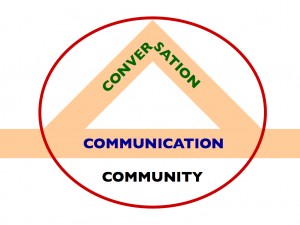Written by Joey Cope
Originally posted on peacebytes.org
 You know that feeling you get? The one that starts deep in your stomach and then expands to point that breathing becomes tough? That feeling.
You know that feeling you get? The one that starts deep in your stomach and then expands to point that breathing becomes tough? That feeling.
Anxiety surfaces in a lot of situations. Apprehension of things to come. Fear of things both seen and unseen. And that fear and apprehension can paralyze you.
The presence of conflict in our lives brings on that anxiety. Sometimes the paralysis is total. Ancient defense systems kick into play. Through the lens of an anxious person, we weigh the costs of flight. Yet, conflict is such a constant in our lives that the rational side of our brain reminds us that we can’t always flee. We have responsibilities right here . . . at home, at work, in a group of friends. While we would rather not deal with conflict at all, it stands directly in our path.
The other alternative is to fight. The urge to fight also has its costs. Society frowns on it. Overt fighting puts us into a win-lose situation. Relationships are destroyed. The rational mind is risk-averse. The odds for victory must be slanted in our favor for us to willingly engage in battle. We will plunge head-on into the fray when our survival is at stake.
Years of dealing with conflict have presented us with other “fight options.” More strategic than tactical, these behaviors are designed to put our opponents on hold — to neutralize the threat until we can piece together a winning game plan.
All of these fight options revolve around the concept of slowing or stopping the progress of the dispute. And, in those situations where we can’t flee and we can’t or shouldn’t engage in an all-out confrontation, our rational minds tell us to cut off, to the greatest extent possible, communication.
Communication can be power. Sloppy communication can be a weapon turned against us. The thought of communication, with our fears of vulnerability, can evoke even greater anxiety. And, in relationships we value, thoughtless communication can cause harm to the other party that we never intended.
Many people say that communication is at the base of all conflict. While it is true that communication problems do contribute in a large way to many disputes, once a conflict is underway the absence of communication is the greatest contributing cause of sustained stress.
As we prepare you to take part in the Better Understanding Project, we are insisting that you make a commitment to the Three Cs: Communication, Conversation, and Community. This first C – Communication – needs a little explanation within the context of this model.
Communication is a huge disciplinary field. I have a number of friends with advanced degrees in communication. I’m amazed at the wisdom they bring to a discussion about communication. But I’m a simple person. And for purposes of the Three Cs, I want to severely limit the definition of “communication.”
COMMUNICATION is the measured, yet free-flow, of information that results from discipline and control.
Nothing else.
When faced with conflict where continued relationship is important, your first move is to ensure that the exchange of accurate and helpful information continues.
For example, let’s say you are working as part of a team at work. As the project unfolds, you and one of your co-workers come to a disagreement on a key element. Anxiety levels escalate. One of your natural tendencies is to shutdown the flow of information.
Part of your reasoning is your perception that information is only adding to the conflict. And it may be if communication was being used as a weapon. But withholding needed information for practical and relational function causes a much larger crisis. It starves the interaction, promotes distrust, and prevents even an attempt at normal function.
As painful and as nonintuitive as it may seem, as a person of responsibility and integrity, you must commit to this first C. You must continue to provide information that supports the project. A good portion of that information is conflict-neutral anyway. Full commitment to Communication also demands that you exercise discipline and control in providing full and accurate information for those details surrounding the matter in conflict.
The passive-aggressive act of withholding needed information is a fighting behavior. Individuals who are truly committed to peace must recognize it as such and take steps to communicate — even in the most difficult of situations.
When communication flows within the borders of discipline and control, you will be in position to move forward on the second C – Conversation.
The Better Understanding Project is an effort to equip you and those around you with the desire and the skills to enter meaningful dialog on important topics and to develop common ground in difficult times. You owe it to yourself, your friends, and your family.
Commit to Communication. We’ll be taking an in-depth look at Conversation and Community soon.
Leave a Reply